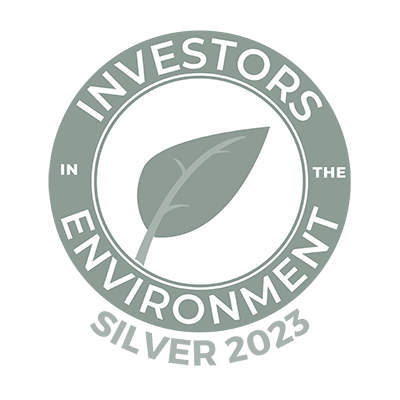Sustainability at The George
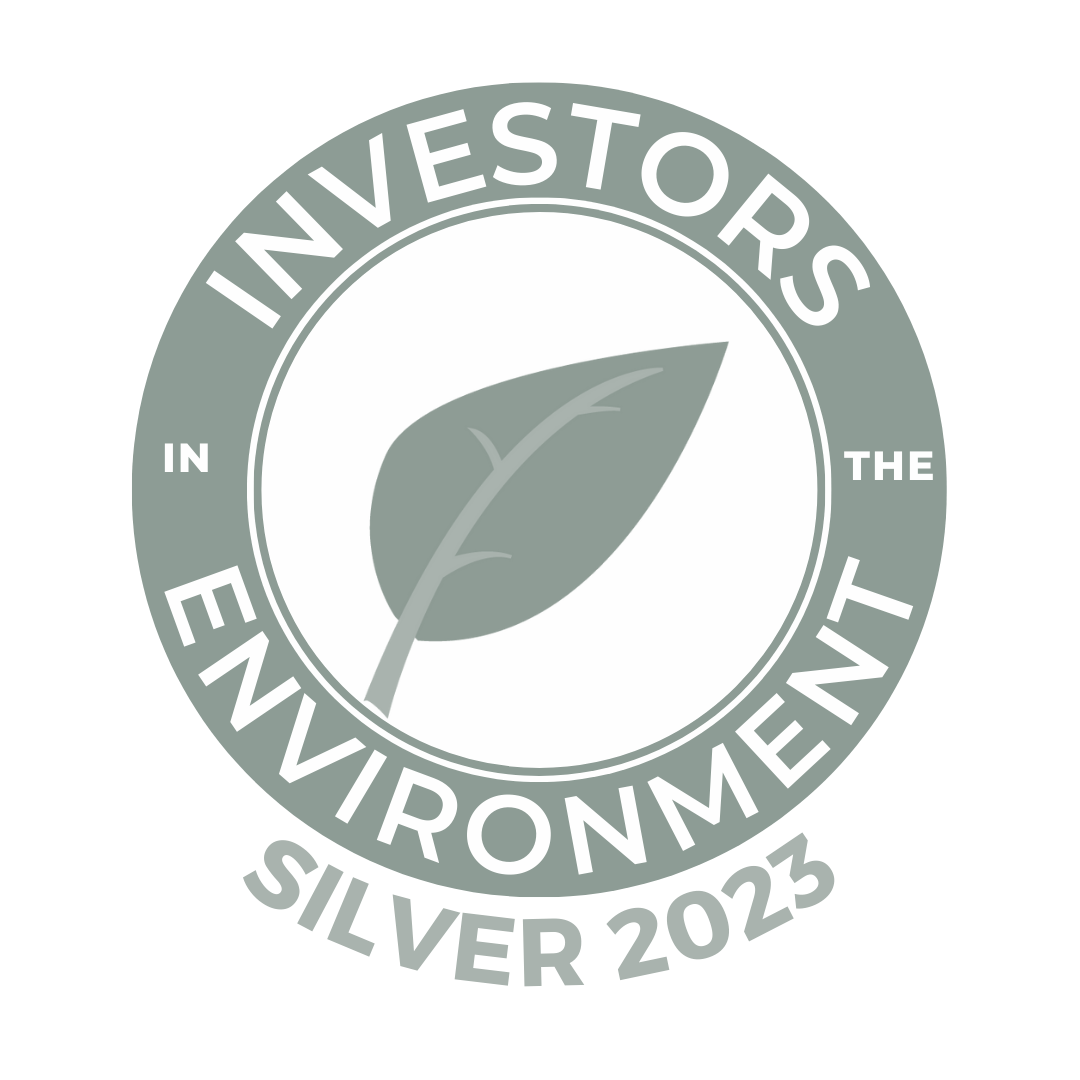
Sustainability is led by a dedicated working Group at The George, made up of volunteers from across the practice, who co-ordinate practice wide initiatives. The Sustainability Group publishes a quarterly newsletter to the practice to highlight achievements and initiatives within the practice both locally and internationally. The newsletter also includes tips and ideas on how our employees can become greener at home, as well as at work - for example, banking sustainably could decrease your carbon footprint by 25%!
Having achieved our Bronze accreditation in 2021, one of the key achievements for the Green Group has been its continued focus on the business attaining the Silver level IIE accreditation, awarded first in December 2022 and again in 2023. The silver level can take anywhere between 1 and 3 years to achieve and so we are particularly proud of the work done across all areas of our business towards larger scale changes/improvements since our last award. In order to achieve this, we had to demonstrate our commitment by calculating a carbon footprint for the business. We also set and achieved targets on energy, waste, biodiversity initiatives and community and staff engagement.
You can view our environmental policy here
While we continue to consider further opportunities to those already being delivered listed below, our Sustainability Group is keen to hear from anyone outside the business inviting your thoughts on new initiatives we might consider. We welcome your ideas, which you can submit through the form below with as little or as much detail as you would like. We will then discuss any ideas at our next Group meeting. Thank you for your contribution!

Reductions in paper usage
Across the practice we are committed to decreasing our use of paper; since Jan 2020 we have invoiced our clients via emails rather than through the post. In the farm department alone, we have reduced our paper use by over 3600 bills and envelopes every year!
The small animal team often carry out pre-anaesthetic blood tests to ensure that animals scheduled for surgery do not have any underlying health issues. These used to be automatically printed by our lab machine but are now all digitized - it means we no longer have a printed page of results for every patient. This saves resources and decreases our waste through paper savings.
All the microchips we implant in for clients' pets are registered online rather than through a paper form in an envelope. With approximately 560 pets registered annually, this has made for huge paper savings!

Recycling
 We have increased the number of recycling bins around our business and also created multiple recycling streams for practice generated waste - from the obvious paper and cardboard, to batteries, printer cartridges, lightbulbs, electrical items and crisp packets.
We have increased the number of recycling bins around our business and also created multiple recycling streams for practice generated waste - from the obvious paper and cardboard, to batteries, printer cartridges, lightbulbs, electrical items and crisp packets.
We carry out bin audits periodically to ensure that our recycling streams are not contaminated with non-recyclable items, this has made everyone much more aware of what can be recycled and why - hopefully filtering through to home recycling practices as well.

Reduced magazine subscriptions
Throughout the business, we have massively reduced our veterinary magazine subscriptions. It is routine in the industry for every vet to be automatically sent their own individual copy of multiple magazines each month. We compiled a list of subscriptions across each department and cancelled all but one copy of each. Bearing in mind we have 18 farm vets, 5 pig vets, 7 equine vets and 16 small animal vets, who were each probably receiving an average of 3 magazines per month, we have decreased the waste being produced by about 90%!

Monitoring greenhouse gas contributors
 Isoflurane is the anaesthetic agent commonly used in both human and animal general anaesthetics. But did you know that Isoflurane is a Greenhouse gas? Emissions from using one bottle of Iso are equivalent to driving from Plymouth to John O'Groats, and this type of inhalational anaesthesia currently contributes 5% of the NHS's carbon footprint.
Isoflurane is the anaesthetic agent commonly used in both human and animal general anaesthetics. But did you know that Isoflurane is a Greenhouse gas? Emissions from using one bottle of Iso are equivalent to driving from Plymouth to John O'Groats, and this type of inhalational anaesthesia currently contributes 5% of the NHS's carbon footprint.
While there is absolutely no way we, or any medical facility, can stop using Iso on a day-to-day basis, with this knowledge we can at least make sure we are doing what we can to use it in the most responsible way. At the George we are already using technology to monitor our anaesthetics as closely as possible, thereby using Isoflurane as efficiently as we can. When 190kg of CO2 is produced per 250ml of Iso, every bottle saved through best anaesthesia practice is a huge win, for the planet and for our patients.

Driving economically
 A major consideration in our sustainability is our ambulatory vet service. Within the practice we use "Webfleet" a tool to track and monitor our vehicles and how they are being driven - reviewing any harsh braking, steering and excessive speed.
A major consideration in our sustainability is our ambulatory vet service. Within the practice we use "Webfleet" a tool to track and monitor our vehicles and how they are being driven - reviewing any harsh braking, steering and excessive speed.
Within the practice we publish a league table of our most economical drivers in our newsletters to encourage all to drive more efficiently and thereby use less fuel. It encourages a focus for all to consider the way we drive, both at work and in our personal time, and demonstrates how they can have an effect on the economy of the vehicles we all drive.
As battery technology improves and our existing vehicles reach the end of their lifetime, we will look to replace with electric alternatives. We need a real life range of around 250 miles to make this a viable proposition for our busy ambulatory vets.
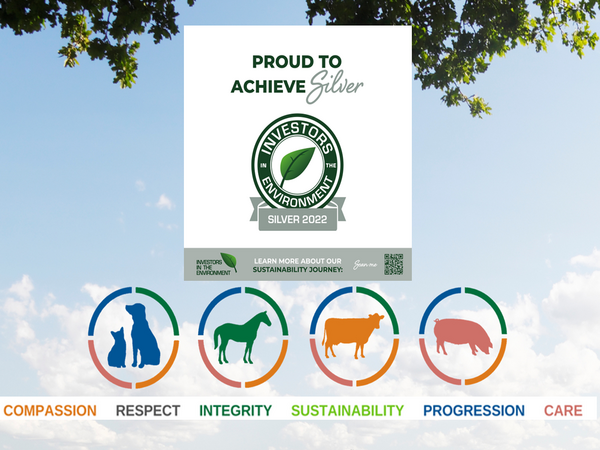
We practice what we preach
 In 2021, the farm team launched 'Cultivate' - a sister company to focus on the delivery of CPD (Continuing Professional Development). The first training program it delivered was a course for vets on regenerative agriculture, and how to promote sustainability in clients' farms. We hope to continue to promote our sustainability goals through many more future learning opportunities.
In 2021, the farm team launched 'Cultivate' - a sister company to focus on the delivery of CPD (Continuing Professional Development). The first training program it delivered was a course for vets on regenerative agriculture, and how to promote sustainability in clients' farms. We hope to continue to promote our sustainability goals through many more future learning opportunities.

Sustainable farming group
The George Farm Vets set up a Sustainable Farming group for our farm clients, currently with about 50 members. We have hosted talks and events on several topics, from Carbon Calculators to herbal leys. We've been really enthused by the participation and the amazing steps farmers are already taking to reduce carbon emissions - increasing the ability for their farms to act as carbon sinks, as well as increasing biodiversity and wildflowers on their land, and plant crops which increase soil quality and decrease insecticide and antibiotic use on farms.
Over the last 3 years The George Farm vets' clients have collectively reduced their antibiotic use by 11% EVERY YEAR! This is an incredible decrease which just shows what a difference farmers and vets working together can make.

Temperature control
 Our wonderful nurses have made some excellent steps in terms of controlling the ambient temperature in the small animal department. This is hugely important as we need to be able to maintain a constant body temperature for animals under general anaesthetic. The team developed a protocol to ensure we are using the heating controls as efficiently as possible, while also maintaining a pleasant environment in which to work. It has removed the need for heating/cooling systems to have to work on 'maximum' all the time.
Our wonderful nurses have made some excellent steps in terms of controlling the ambient temperature in the small animal department. This is hugely important as we need to be able to maintain a constant body temperature for animals under general anaesthetic. The team developed a protocol to ensure we are using the heating controls as efficiently as possible, while also maintaining a pleasant environment in which to work. It has removed the need for heating/cooling systems to have to work on 'maximum' all the time.

Changed habits in theatre
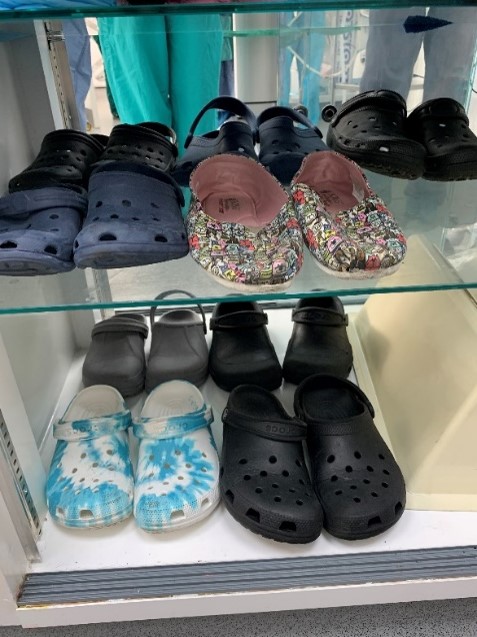 Our theatre staff now all use dedicated 'theatre shoes' having switched from single use plastic shoe covers previously - these keep both our surgical areas and the planet clean; we have eliminated the use and disposal of 3000 shoe covers every year!
Our theatre staff now all use dedicated 'theatre shoes' having switched from single use plastic shoe covers previously - these keep both our surgical areas and the planet clean; we have eliminated the use and disposal of 3000 shoe covers every year!
We also now use only reusable theatre caps rather than single use plastic hair nets. As well as a huge saving for the planet, they make our staff look cool too!

Sustainable toys for your pets
Our small animal department stocks sustainable pet toys and beds. These are made from recycled materials such as old plastic bottles, t shirts and recovered ocean plastic, so even our four-legged pals can get involved with being Green.

Soil and Environmental Health
One of our farm vets, Ed Bailey, works closely with the Soil Association. They are instrumental in championing the health of our soils and natural environment, and work closely with farmers to assist with their hard work in utilizing our soil as a natural carbon sink. He has been working with AHDB in their Delivering Grass Expertise programme, which will see him encouraging and mentoring farmers on the benefits of effectively utilizing grazing to minimize the amount of alternative feed we need to provide for the UK's cattle. This alternative feed often comes with a carbon cost as many ingredients are imported and may not be sustainable sourced.
Grazing of ruminants on British land is an important way to sustainably rear our meat. Ed has also been working with Vet Sustain as part of their Food and Farming working group. They are instrumental in driving the sustainability of the profession - you might like to have a look at their website to see how our industry is working hard to become more green.

Pet treatments which protect our insects
 We all know that insects are essential to our survival on this planet. The Webinar vet has recently released a Webinar on The environmental fate of pet flea products which is available to watch for free.
We all know that insects are essential to our survival on this planet. The Webinar vet has recently released a Webinar on The environmental fate of pet flea products which is available to watch for free.
Spot on treatments are known to be an issue as they are easily washed off, and eventually end up in the environment where they kill many more species of insect than just the fleas and ticks we target. Accumulation of topical pet treatments is now affecting the numbers of insects in the UK and worldwide. Fewer insects = fewer pollinators for our crops. At the George we aim to dispense in mainly tablet form for dog parasite treatments. We understand cats are more of an issue as many people often struggle to get tablets into them! But we hope this is something we can all bear in mind, and we are happy to discuss the pros and cons of each type with you when you are making the choice about which products to use.

Eliminating single use plastics
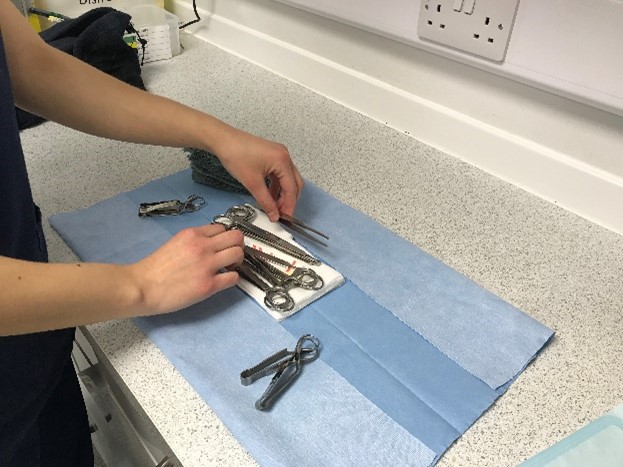

Recycling equine inhalers
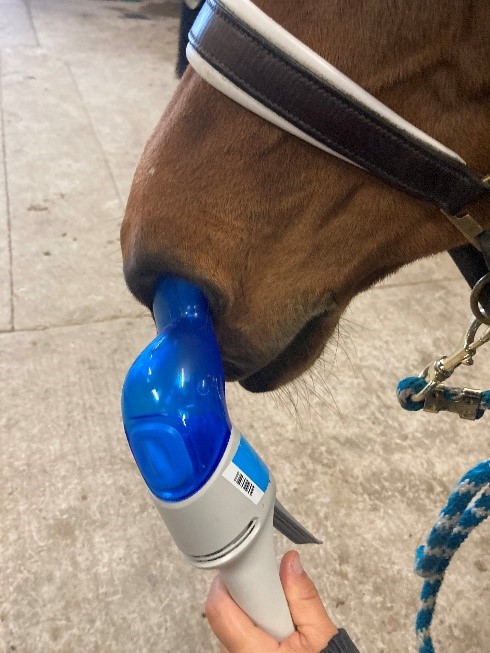 Equine inhalers are bulky bits of plastic kit which are used to deliver certain drugs directly into the airways of horses - similar to the way a human inhaler is used. Previously they had to be discarded after use, however we are now working with Boehringer, who make the inhalers, to recycle them after use.
Equine inhalers are bulky bits of plastic kit which are used to deliver certain drugs directly into the airways of horses - similar to the way a human inhaler is used. Previously they had to be discarded after use, however we are now working with Boehringer, who make the inhalers, to recycle them after use.

Flowers in reception
 The faux flowers in the Malmesbury and Nailsworth reception areas are provided through a company called 'Floral Image' - they are swapped once a month and rotated through all the companies signed up to the service. This reduces waste, claiming to be 80x better for the environment than 5 years' worth of fresh flowers!
The faux flowers in the Malmesbury and Nailsworth reception areas are provided through a company called 'Floral Image' - they are swapped once a month and rotated through all the companies signed up to the service. This reduces waste, claiming to be 80x better for the environment than 5 years' worth of fresh flowers!


